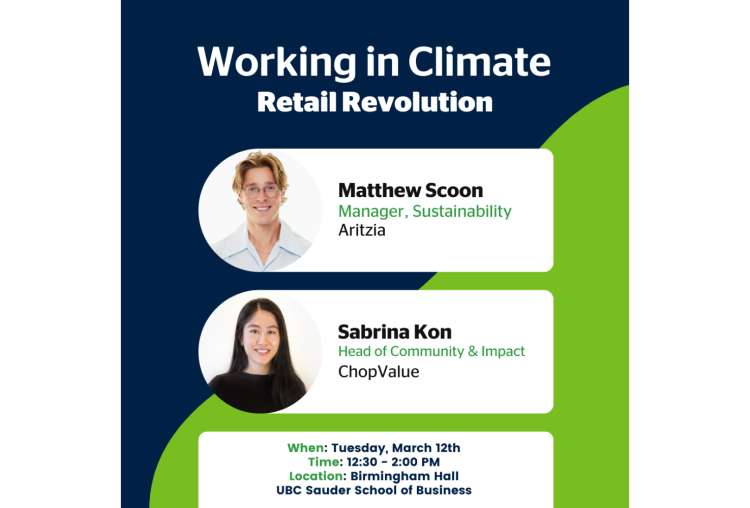
Working in Climate Retail Revolution

"Now is the best time to be working in sustainability", shared Matt Scoon, Manager of Sustainability at Aritzia. The retail landscape is undergoing a remarkable shift, where sustainability isn't just a buzzword but a competitive advantage.
On March 12th 2024, the Centre for Climate and Business Solutions hosted a groundbreaking panel discussion titled "Working in Climate: Retail Revolution". Together with Sabrina Kon, Head of Community and Impact at ChopValue, the two esteemed panellists shared their insights and experiences, shedding light on the transformative power of sustainability in the retail sector.
Introductions and Roles
Matt Scoon plays a pivotal role within Aritzia's cross-functional sustainability team, consisting of ten individuals dedicated to integrating various aspects of sustainability, from human rights to climate action, into the company's operations. At Aritzia, renowned for its commitment to offering Everyday Luxury to young North American women, Scoon specifically explores sustainable material sourcing and energy solutions. Leveraging his academic background in political science and energy policy, Scoon is discovering ways to improve battery storage and renewable energy in the organisation. The role also largely involves educating, pitching and motivating - Scoon emphasised the delicate balance of advocating for sustainability initiatives while navigating corporate dynamics.
Sabrina Kon shared exciting, tangible initiatives at ChopValue, a company that engineers recycled chopsticks into furniture with a mission to promote circular economies. As a Head of Community and Impact, Kon is a key player in strategising and growing partners and franchise locations. For example, the ChopValue Microfactory collects, manufactures, and distributes locally to support circular economies within communities. Kon underlined the power of partnerships and consumer engagement in deploying these initiatives.
Collaboration and Storytelling
Collaboration emerged as a foundation of sustainability efforts within and across companies. Both panellists highlighted that during these collaborative interactions, storytelling is critical in effectively advocating for sustainability initiatives.
Especially at a retail giant like Aritizia, challenges in pitching sustainability initiatives stem from the payback of sustainability-focused investments being longer than conventional investments (five to six years vs. two to three years). Scoon shared that preparing a cost-benefit analysis, a comprehensive roadmap, and employing an inspiring narrative are essential in getting the company's buy-in. Scoon shared that easy-going, fun, and motivating attitudes are crucial when advocating sustainability in corporate environments.
A similar concept can apply to ChopValue when attaining B2B partnerships to facilitate the placement of chopstick recycling bins in accessible locations. More importantly, customer engagement is essential to collect sufficient used chopsticks. Kon discussed that the first step is to shift the consumer mindset away from single-use items and towards a circular economy. ChopValue uses effective marketing as its storytelling avenue to enlighten consumers to consider the end life of single-use chopsticks and place their used chopsticks in ChopValue's recycling bins.
The two panellists suggest that understanding the audience's values is critical in shaping a convincing narrative. By fostering trust and community involvement, retail organisations can drive impactful change and create a more resilient and interconnected ecosystem.
Trends and Opportunities in Sustainable Retail
The panellists shared numerous exciting trends in sustainable retail.
Circular economy and life cycle thinking are some of the notable trends. Instead of focusing solely on production and consumption, retailers are increasingly considering the entire lifecycle of products, from sourcing raw materials to end-of-life disposal or recycling. Even Aritzia, whose core mission does not involve sustainability targets like ChopValue, is strategising ways of improving the circularity of its materials. Kon emphasised the importance of keeping products within closed systems and maximising their value throughout their lifecycle. Circularity not only tackles the waste problem but also opens up opportunities for innovative business models centred around reuse, refurbishment, and recycling.
Diving further into circular economies, identifying and innovating sustainable alternative sources of materials is another trend in which retailers are increasingly investing. While ChopValue's mission is transforming single-use chopsticks that usually end up in waste into furniture that another customer can take home, the organisation is also dedicated to minimising packaging. In this process, consumer education and engagement were highlighted as a vital component of the change. As suggested by Kon, retailers have the power to deliver the message to consumers. Scoon also underscored the importance of transparent communication and marketing to convey that sustainability-focused decisions are made to benefit the customer and climate, ultimately mitigating greenwashing and greenhushing. In addition to opportunities for innovation, consumer engagement is also an opportunity for retailers to encourage the demand for sustainable products.
Lastly, the two panellists also discussed supply chain transparency. They noted the importance of supply chain visibility in achieving circularity and net zero. Retailers have opportunities to tackle various parts of the supply chain to meet sustainability objectives, from tracing the origins of products and ensuring fair labour practices to minimising environmental impact across the entire supply chain.
While trends in the landscape of sustainable retail are constantly evolving, it is evident that the demand for sustainable action by retailers is growing. By staying ahead of these trends and leveraging opportunities for collaboration and innovation, retailers can position themselves as leaders in the transition towards a more sustainable future. Now really is the best time to be working in sustainability!
Advice for Future Professionals
Scoon and Kon emphasised the importance of networking and continuous learning for aspiring sustainable retail professionals. By building relationships and staying informed of current trends, future professionals can drive meaningful change within the industry. Events hosted by the Centre for Climate and Business Solutions are perfect opportunities to meet and learn from industry leaders in sustainability. Please follow our LinkedIn page at https://www.linkedin.com/showcase/ubcsauder-climatecentre/ to stay updated on our future events!
Stay in touch
Discover what’s new in our recent announcements.
Read about our latest research, led by our responsible leadership at the forefront.
Keep connected with our community.